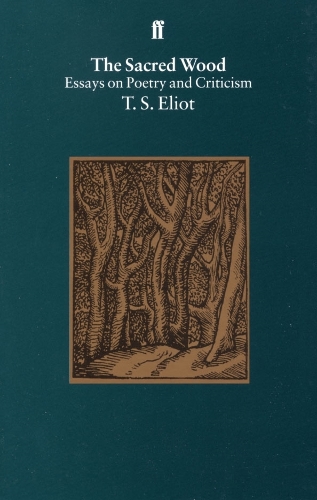
The Sacred Wood
(Paperback, Main)
Publishing Details
The Sacred Wood
By (Author) T. S. Eliot
Faber & Faber
Faber & Faber
1st July 2005
21st April 1997
Main
United Kingdom
Classifications
Professional and Scholarly
Non Fiction
Literary theory
Essays
809
Physical Properties
Paperback
176
Width 128mm, Height 198mm, Spine 12mm
140g
Description
This seminal book, Eliot's first collection of literary criticism, appeared in London in 1920, two years before The Waste Land. It contains some of his most influential early essays and reviews, among them 'Tradition and the Individual Talent', 'Hamlet and his Problems', and Eliot's thoughts on Marlowe, Jonson and Massinger, as well as his first tribute to Dante. Many of his most famous critical pronouncements come from the pages of The Sacred Wood.Reviewing his career as a critic in 1961 Eliot wrote that 'in my earlier criticism, both in my general affirmations about poetry and in writing about authors who influenced me, I was implicitly defending the sort of poetry that I and my friends wrote. This gave my essays a kind of urgency, the warmth of appeal of the advocate, which my later, more detached and I hope more judicial essays cannot claim.' This urgency is still apparent more than eighty years after the essays first appeared.
Author Bio
Thomas Stearns Eliot was born in St Louis, Missouri in 1888. He was educated at Harvard, at the Sorbonne in Paris, and at Merton College, Oxford. His early poetry was profoundly influenced by the French symbolists, especially Baudelaire and Laforgue. In his academic studies he specialised in philosophy and logic. His doctoral thesis was on F. H. Bradley. He settled in England in 1915, the year in which he married Vivienne Haigh-Wood and also met his contemporary Ezra Pound for the first time. After teaching for a year or so he joined Lloyds Bank in the City of London in 1917, the year in which he published his first volume, Prufrock and Other Observations. In 1919 Poems was hand-printed by Leonard and Virginia Woolf. His first collection of essays, The Sacred Wood, appeared in 1920. His most famous work, The Waste Land, was published in 1922, the same year as James Joyce's Ulysses. The poem was included in the first issue of his jou
